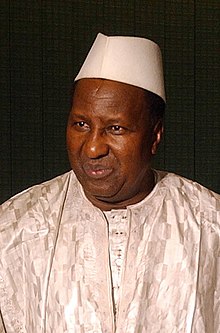Alpha Oumar Konare
Alpha Oumar Konaré (born February 2, 1946 in Kayes ) was President of Mali from 1992 to 2002 .
academic career
Konaré comes from Kayes in the west of what was then French Sudan and is the fifth of 14 children of a teacher. He attended school there since 1951 and in 1957 went to the Lycée Terrason de Fougères in the capital Bamako and to the Collège des Maristes in Dakar . In 1960 he attended the Collège Moderne in Kayes and from 1962 to 1964 the École Normale Supérieure in Katibougou. He then studied history from 1965 to 1969 at the École Normale Supérieure in Bamako and from 1971 to 1975 at the University of Warsaw . After his training he worked as a teacher in Kayes and Bamako. From 1975 to 1978 Konaré was head of the history and ethnography department in the Ministry of Youth, Sports, Art and Culture. In 1980 he received a research assignment at the Institut Supérieur de Formation en Recherche Appliquée and became a professor at the Faculty of History and Geography of the École Normale Supérieure in Bamako. In the following years he was chairman of various academic associations of historians, geographers and archaeologists. From 1981 to 1982 Konaré was an advisor to UNESCO and the United Nations Development Program (UNDP).
Professor Konaré holds honorary doctorates from the University of Michigan and the University of Rennes . He published several works on historical and archaeological topics.
Political career
In 1967 Konaré became general secretary of the youth organization of the Union soudanaise (US-RDA) , which emerged from the movement Rassemblement Démocratique Africain , at the École Normale Supérieure in Bamako. After the coup of Moussa Traore in 1968 he joined the active underground Marxist party Parti du travail malien on. Believing in Traoré's readiness for reform, he became Minister for Youth, Sport, Art and Culture in 1978, but resigned in 1980. In office he was strongly committed to promoting sport. In 1983 he founded the cultural magazine Jamana and in 1989 the daily newspaper les échos . In the course of 1990 Traoré's one-party rule was challenged by new opposition groups. Konaré was a co-founder of the Alliance pour la démocratie au Mali ( ADEMA-PASJ ) , which became part of a gathering movement of forces against Traoré. He became the first president of the rally movement.
On March 26, 1991, a military coup ended Traoré's presidency. Konaré founded the radio station Radio Bamakan and became a delegate of the national conference, which should draft a new constitution and prepare elections.
president
In 1992, Mali saw the first free elections since independence from France in 1960. In the parliamentary elections on February 23 and March 8, 1992, ADEMA achieved 76 of the 116 seats in parliament. He ran to succeed the interim president Amadou Toumani Touré , who was involved in the March coup against Traoré. In the first ballot on April 12, 1992 he was in first place with 44.95% of the votes and won the second ballot two weeks later with 69.01% against Tiéoulé Mamadou Konaté. On May 11, 1997, he was confirmed in office with 95.9% of the votes in the first ballot, with most of the opposition parties boycotting the elections. In the parliamentary elections, which were also boycotted by part of the opposition, ADEMA received 128 of the 147 MPs at the end of July / beginning of August. The parliamentary elections of April 1997 were canceled by the Constitutional Court due to irregularities and had to be repeated. In the elections between 1992 and 1997, the turnout was only between 20 and 30%. Since the constitution limits the president's term of office to two terms, he could not run again in 2002. The ADEMA candidate , Soumaïla Cissé , was defeated in the second ballot by Amadou Toumani Touré, who prevailed on May 12, 2002 with 64.35% of the vote and was succeeded by Konaré on June 8, 2002.
In 1999 he was chairman of the Economic Community of West African States (ECOWAS) until December 21, 2001 and in 2000 he was chairman of the West African Economic and Monetary Union (UEMOA). In memory of Modibo Keïta, who fell in 1968, he opened the Memorial Modibo Keïta on June 6, 1999 in Bamako . As an opponent of the death penalty , Konaré pardoned ex-President Moussa Traoré on May 29, 2002, who had been sentenced to death for all kinds of offenses during his term in office. During his tenure there was a peaceful settlement of the conflict with the Tuareg . In addition, he achieved that the African Cup of Nations 2002 took place in Mali. The year before, he had received the Ordre du Mérite of the Confédération Africaine de Football (CAF) association.
From September 16, 2003 to February 1, 2008 Konaré was Chairman of the Commission of the African Union . The heads of state of the Union had elected him to this post at a summit meeting in Maputo on July 10, 2003.
family
Konaré has been married since July 15, 1971 and has four children. His wife, Adame Ba, is a professor of history.
Web links
- Election results in African Elections Database (English)
- Biography on the official website of the government of Mali ( memento of June 20, 2006 in the Internet Archive ) (French)
- Afrique Express on his election as Commission President of the AU, July 16, 2003 (French)
- Die Zeit: "How Mali's ex-President Alpha Oumar Konaré wants to renew the continent of Africa", November 3, 2005
| personal data | |
|---|---|
| SURNAME | Konare, Alpha Oumar |
| BRIEF DESCRIPTION | Malian President |
| DATE OF BIRTH | February 2, 1946 |
| PLACE OF BIRTH | Kayes |
